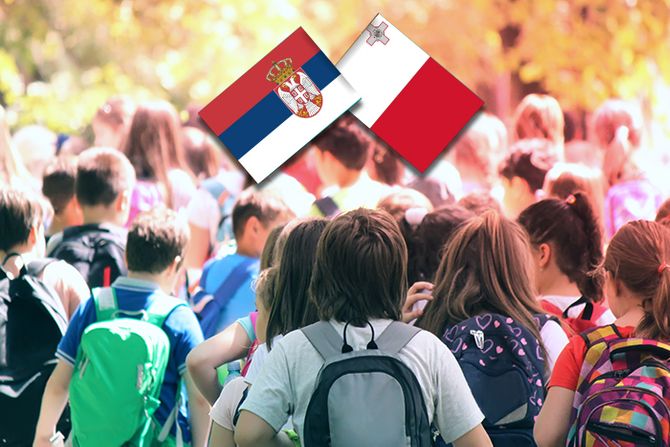
The torment of Serbian families in Malta: "Children are desperate, crying"
Malta's government on Tuesday defended its decision to refuse to issue residence permits for 22, mostly Serbian children, stressing that the children would in this way avoid the risk of living in poverty.
Malta Parliamentary Secretary Julia Farrugia Portelli said parents have the right to appeal the decision to have their children deported from Malta, and if they do, their cases will be dealt with by an independent court. According to her, the government of that country made the decision to deport the children from Malta with "their best interest" in mind - so as not to put them at risk of living in poverty.
The Ministry of Foreign Affairs of Serbia became involved in the case. The Serbian ambassador to Italy will travel to Malta on Wednesday.
"We asked them to once again consider the whole situation. I spoke on the phone with my colleague Foreign Minister Abelo, he promised to convey this to the government of Malta. What is certain is that no action will be taken before Christmas and New Year holidays," Minister Ivica Dacic said according to RTS.
The fear of the Serbians is not diminishing, especially since two families were notified on Tuesday that their children had been denied residence.
Some parents told the daily Novosti that they are awaiting in fear the final decision of Malta's authorities.
"The kids are desperate, crying, they understand everything. Many more children were given rejection notices than has been reported in the media. In one day, 22 children received it and then an article was published in a Maltese newspaper. All parents are in the same position, we have work permits, we pay taxes and contributions, our children go to school here, they are accustomed to it," says Anja Trifunovic from Belgrade, who came to Malta in April this year while her husband arrived a year earlier.
The problem with residence permits arose when they were not issued to the children of parents who earn less than 19,000 euros a year plus 3,800 per child. Trifunovic explains that their income is 24,400, while it should be 26,000 euros a year. She points out that the standard in Malta is slightly higher than in Belgrade and that their earnings are more than sufficient for a normal life.
"Since September we have been trying to contact relevant institutions in Malta, as well as the Commissioner for Children's Rights. In the end, one parent was told that they could do nothing, that this was the law of the Immigration Department," Trifunovic said.
These families emphasize that the Maltese people are very kind and doing their best to help.
Zorana Simonovski from Belgrade says that they received a letter on December 14 that the children had been refused an immigration visa:
"Right the next day a notice came from the Ministry of Education that their tuition and scholarship had been canceled. However, the Maltese immediately rose to their feet to help, from the management and the owner of the hotel to my neighbors, friends and colleagues. They created a support group, donating money. They are a wonderful compassionate people, and they are upset by this situation as much as we are."
In less than 24 hours, 3,000 signatures were collected thanks to a petition calling for children to remain in Malta. Former President of Malta and head of the Eurochild organization Marie-Louise Coleiro Preca met with the parents, who said she was appalled by the treatment of the Serbian children and that the agency issuing residence permits was violating numerous regulations. Archbishop of Malta Charles Scicluna, tenor Joseph Calleja, and numerous other public figures also got involved. A total of 20,000 euros has been raised through various campaigns.
Video: Bouncer beats a Pole outside Maltese nightclub
(Telegraf.rs/Novosti)
Video: Pit Hegset i Mark Rute na sastanku ministara odbrane NATO u Briselu
Telegraf.rs zadržava sva prava nad sadržajem. Za preuzimanje sadržaja pogledajte uputstva na stranici Uslovi korišćenja.

